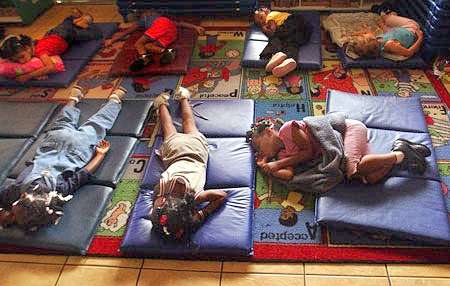Kindy kids (attending for short periods!) earn more in later life – study
 Radio NZ News 4 July 2017
Radio NZ News 4 July 2017
Family First Comment: But here’s the key bit. We’re not talking about ‘daycare’ that averages over 20 hours and can go higher than 40 hours per week – for babies and toddlers as well!
Here’s what period of time the study is referring to..
“The study found 82% of participants attended early childhood education for an AVERAGE OF 7.7 HOURS when they were between three and four years old, and 93 percent attended for an AVERAGE OF 13 HOURS between the ages of four and five.”
Yep – perhaps 2-3 mornings or afternoons per week at the most.
The real research to watch will be in 30 years when we see the results of very young children spending very long periods of time in childcare. It won’t be pretty.
People who went to playcentre or kindergarten in the early 1980s are now earning thousands of dollars more than those who did not, a report from the Christchurch Health and Development Study shows.
The Otago University project has found a persistent link between early childhood education more than 35 years ago and better academic achievement, higher incomes and more consistent employment in later life.
The report said 95 percent of the 1265 people in the study attended some form of early childhood education with 85 percent attending for more than a year, and nearly a third for two years or more.
The participants were born in mid-1977 and 93 percent attended early education between the ages of four and five years old, with 70 percent going to kindergarten and 17 percent to playcentre.
The report said those with two to three years of early childhood education were earning on average $50,200 a year by the age of 30, compared with $43,000 for those with none and $45,400 for those with less than one year of early education.
They had better verbal and maths skills than other children at school, were more likely to go to university, and had higher average academic achievement by the age of 30.
They were also less likely to become a parent or commit a property or violent crime during their teens.
The report said the better outcomes were likely the result of higher secondary school achievement of those who attended early childhood education.
The study found 82 percent of participants attended early childhood education for an average of 7.7 hours when they were between three and four years old, and 93 percent attended for an average of 13 hours between the ages of four and five.
READ MORE: http://www.radionz.co.nz/news/national/334449/kindergarten-kids-earn-more-in-later-life-study







